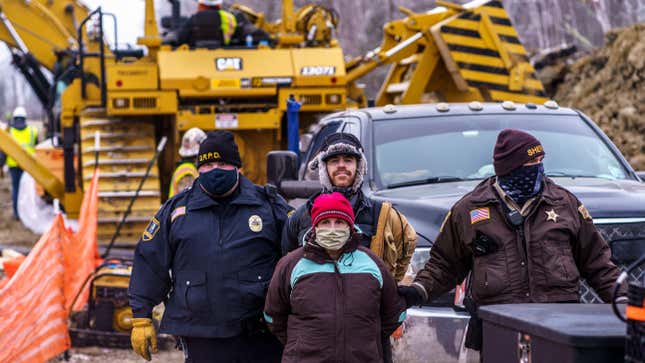
Republicans posture as the party of free speech. Except when it’s speech they don’t like.
This week, the Montana legislature passed what is among the most, if not the most, extreme anti-pipeline protest laws in the country. Gov. Greg Gianforte, a man best known for assaulting a reporter and killing wolves, is expected to sign a bill into law that would criminalize protesting fossil fuel infrastructure. It would foist up to $150,000 in fines and 30 years in prison on individuals convicted of protest-related “vandalism” and $1.5 million in costs on any organizations charged as “conspirators.” Republicans legislators that have backed the bill have also singled out Indigenous-led protests as a reason for the bill, citing falsehoods to pass a bill to protect fossil fuel interests.
“What they see in the past few years is how important Native Americans’ voice is,” said Keaton Sunchild, the political director of Western Native Voice, referring to the legislators who passed the bill. “If we’re not able to protest these types of projects, then there’s not a dissenting voice. They’re able to silence a large chunk of activists and say, ‘look, there’s no opposition to this project,’ when in reality, there’s a huge opposition.”
Laws that impose steep fines for fossil fuel protests have sprung up around the U.S. in recent years, largely thanks to Republican legislators and governors. Thirty states have some form of anti-fossil fuel protest laws on the books, many of which crib from the conservative American Legislative Exchange Council’s model bill to protect what’s legally known as “critical infrastructure.” The goal is simple: quell free speech and silence opposition to fossil fuel projects by imposing harsh fines and jail time for protesters exercising their First Amendment rights.
But even among these laws, the Montana legislation stands out. The fines and jail time are the steepest yet, and could be imposed on a “person who willfully damages, destroys, vandalizes, defaces, or tampers with equipment in a critical infrastructure facility.” Laws criminalizing trespass and vandalism are already on the books, though. Connor Gibson, an independent researcher who runs Grassrootbeer Investigations and has tracked the bill, said in an email that “it’s the loopholes built to punish nonviolent offenders that are the crux of the legislation in Montana and most other states.” Vague language in the original bill opened the door to abuse by local law enforcement and the court system, though the final bill says damages “greater than $1,500" could trigger the most extreme fines and jail time. It’s a small consolation, though, in a bill that could still be ripe for abuse if adopted.
“The conspiracy offense in the Montana bill and bills like it can easily chill organizers of protests,” Nick Robinson, a senior legal adviser for the International Center for Nonprofit Law’s U.S. program, said in an email. “Many groups don’t want to risk being charged as a conspirator if a protester at a demonstration they organize trespasses near a pipeline, meaning the organization could face a debilitating fine. Even if the group prevails in defending themselves, such a legal defense can be very costly. A conspiracy provision like this provides prosecutors too much discretion to go after groups that organize protests.”
Another wrinkle to the Montana legislation is its clear targeted response to Indigenous protesters. State Rep. Steve Gunderson, the primary sponsor of the bill, invoked the protests against the Dakota Access pipeline in neighboring South Dakota as a reason for introducing the legislation.
“We saw at the DAPL pipeline what can quickly happen: protestors chaining themselves to equipment,” he said at a hearing about the bill. “Protestors linking arms to ban crossing a bridge. That peaceful protest quickly changed into violent rioting, burning tires, burning vehicles, the throwing of homemade explosive pipe bombs. I’ll leave you with that visual, and the lingering smell of tear gas.”
Quite an image, but as Gibson has documented, a false one. In fact, authorities presented falsehoods about protesters at Standing Rock multiple times (imagine that). Despite eventually correcting the record, that misinformation is now being used to clamp down on protesters.
“Treaties are already violated up and down, Native communities are routinely ignored on matters of sovereignty, why would they start caring now?” Gibson said, referring to the Republicans who backed the bill.
While there has been widespread opposition to the bill from civil society, the proponents of the bill are all fossil fuel and other extraction interests. Campaign finance records show Gunderson has also taken money from them, including the PACs tied to Phillips 66, Conoco, Northwestern Energy, the Montana Wood Products Association, and Weyerhaeuser, another timber company. Those donations are all in the hundreds-of-dollars range, but as we established last week covering another bill attacking environmental groups, it doesn’t take a lot of money to run for office in Montana.
Sunchild said his group’s outreach efforts to try to get the governor to not sign the bill have been unsuccessful. If signed into law along with a multitude of other laws restricting speech and propping up the fossil fuel industry, it would create a dangerous precedent to shut down increasingly loud dissent about the dangers fossil fuels pose locally and globally.
“At the end of the day, we can’t live with polluted water [and] land that burns,” Sunchild said. “That’s the path we’re headed down if they don’t allow us to voice our concerns.”